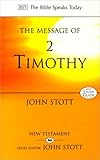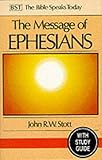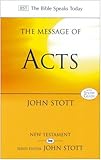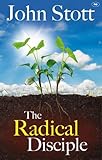 This is actually the second time I have read (and reviewed) this book in the Bible Speaks Today series, but since I was recently going through Thessalonians again, I wanted to re-read it. I feel I have a great collection of commentaries on Thessalonians as I also really enjoyed the ones by Green and Fee. But I always appreciate Stott’s insights, and this volume has the advantage of being more concise (200 pages).
This is actually the second time I have read (and reviewed) this book in the Bible Speaks Today series, but since I was recently going through Thessalonians again, I wanted to re-read it. I feel I have a great collection of commentaries on Thessalonians as I also really enjoyed the ones by Green and Fee. But I always appreciate Stott’s insights, and this volume has the advantage of being more concise (200 pages).
The introduction provides a brief outline of the Acts account. Stott sees the lesson of 1 Thessalonians as “the gospel and the church” and breaks it into five sections which roughly correspond to the five chapters:
- Christian evangelism
- Christian ministry
- Christian behaviour
- Christian hope
- Christian community
Stott has a knack for breaking passages down into structures that might seem implausibly neat at first, but after he goes through the passage, you begin to think that Paul himself probably had the exact same headings in mind.
There is also a brief introduction to 2 Thessalonians, whose structure is broken down as:
- Revelation of Christ
- Rebellion of Antichrist
- Responsibility of Christians meanwhile
I’ll pick out a few highlights from his commentary, which as always is insightful, devotional and practical. On the triad of “faith, hope and love” mentioned in 1 Thess 1:3, he notes that these three virtues are outgoing (faith towards God, love towards others, hope towards the future) and productive (“faith works, love labours and hope endures”).
In the section on “Christian Ministry” (1 Thess 2:1-3:13) he highlights the minister’s dual responsibility, first to the Word of God and second to the people of God. In the section on “Christian Responsibility” (1 Thess 4:1-12) he argues that “There is an urgent need for us, as pluralism and relativism spread world-wide to follow Paul’s example and give people plain, practical, ethical teaching”.
right from the beginning, converts must be told that the new life in Christ is a holy life, a life bent on pleasing God by obeying his commandments.
Although this is by no means an academic commentary series, Stott will refer to the Greek where neccessary, such as discussing the meaning of σκεῦος and κτᾶσθαι in 1 Thess 4:4.
There are a couple of places where I am not sure I agree with his conclusions. For example, he argues that the most likely explanation that some of the “idle” had stopped working was due to their imminent expectation of the Parousia. And his fitting of the “idle, timid and weak” in 1 Thess 5:14 very neatly into groups discussed earlier (so for example the “weak” are the sexually immoral) is ingenious if perhaps a little contrived. I did find his argument that the commands of 1 Thess 5:16-18 are in the context of a church service to make a lot of sense, and it is not an option I had considered before.
As I mentioned in my previous review, he provides a level-headed approach to the teaching on the second coming and antichrist. He also takes opportunities in both books to firmly underscore his opposition to the thought of modern-day apostles.
Overall, I would say that this is classic John Stott, and a fine example of how Biblical exposition should be done. Unless you need the more detailed analysis of Fee or Green, this is a great starting point for getting to grips with the teaching of these two often neglected epistles.







